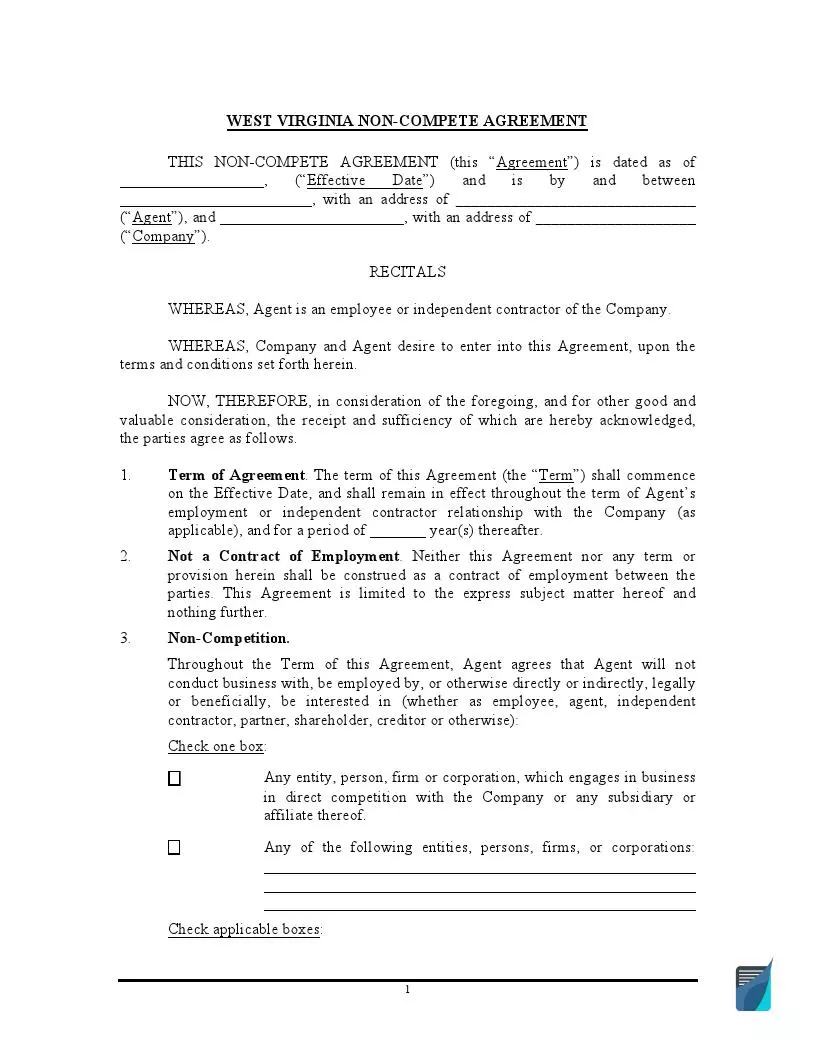West Virginia Non-compete Agreement Template
Plenty of entities in the United States (and West Virginia in particular) prefer to protect their information with legal forms. The West Virginia non-compete agreement is among the commonly used documents for such cases, aimed at keeping the privacy of business operations and confidential information.
The key goal is to protect your entity’s data from the competitors’ interference. Your workers may spread the word by accident. If your competitor gains leverage from the received information, the consequences may be devastating for your business.
Another option for your competitor is to hire your ex-employee. Non-compete agreements often prevent workers from being employed by competing companies.

Build Your Document
Answer a few simple questions to make your document in minutes
Save and Print
Save progress and finish on any device, download and print anytime
Sign and Use
Your valid, lawyer-approved document is ready
By signing a non-compete agreement example, a person (also called the “Recipient” in the form) commits to keep your business’ crucial details in secret. The other party signing the agreement is an entity where the person is employed (or the “Company”). A company can sign such forms with its employees, partners, or independent contractors.
Non-compete agreements establish a set of rules upon which a worker should act, including a period of effectiveness and a sanction for the agreement’s breach.
Usually, non-compete agreements incorporate provisions about the confidential info tied to:
- Customers
- Competitors
- Co-workers
- Software and database
- Business operations.
The West Virginia non-compete agreement template is arbitrary; the state does not propose its official version. However, there is a list of essential details you have to add to any non-compete agreement.
Use our advanced form building software to generate the template. When you prepare the document, ensure that you add these sections:
1. Introduction, with the parties’ names
Each non-compete agreement should start with the recipient’s and company’s names.
2. A section describing confidential data
You have to explain which information is confidential for your business, so your workers understand the limitations. Another vital thing is to add what information is not secret.
3. Conditions section
Here, you have to indicate all possible types of violations and punishment that will follow. Whether to caution your employees or terminate their work contracts is your choice. Another option is to find them.
Remember that privacy is important nowadays, and some people even go to jail after disclosing specific details. However, the punishment for your workers should be reasonable.
4. Terms section
Some employers sign agreements that end when workers leave the company. Others prefer to keep the agreements for a while after workers quit (for example, for a year or two). Some states limit the validity period.
5. Miscellaneous sections
You can add any other section that you consider relevant.
6. Names, signatures, and dates
Both parties must sign and date the non-compete agreement. They should also write their names in the same section. Both parties should receive and keep copies of a non-compete agreement.
Some states propose a list of professions that are exempt from non-compete agreements. For example, in Alabama, lawyers and doctors cannot sign such documents; this applies to security guards and broadcasters in Connecticut. Exemptions can be seen in other states, too. Proceed to the following part to learn about the West Virginia regulations regarding non-compete agreements.
West Virginia NCA Laws and Restrictions
Non-compete agreements, in general, are not mentioned in the West Virginia Code. However, there are Sections that incorporate rules for such contracts for physicians (Sections 47-11E-1, 47-11E-2, 47-11E-3, 47-11E-4 and 47-11E-5).
These Sections constrain the competition among physicians and hospitals in the state of West Virginia. Even though physicians may be obliged to sign a non-compete agreement, there are restrictions to such documents, according to Section 47-11E-2:
- By location. An agreement is valid only in frames of 30 road miles from the place where the physician works.
- By duration. An agreement is valid no longer than one year from the date of signing.
A non-compete agreement between the physician and their employer stops being effective when the employer has fired the physician.

We provide a variety of important West Virginia templates to anyone in quest of ease when handling various paperwork.
